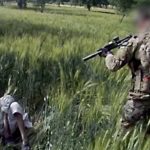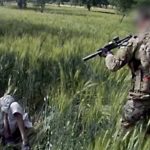AFP Backs Down on Prosecuting Journalist Over ‘Afghan Files’

After months of speculation, the AFP has confirmed that it will not be charging ABC journalist Dan Oakes in relation to reports of atrocities committed by Australian soldiers in Afghanistan, but so far remains intent on prosecuting his source, former Military Lawyer David McBride.
The decision not to pursue charges against Mr Oakes follows a decision by the AFP in July, ruling out pressing charges against ABC producer Sam Clark over his involvement in the 2017 series which revealed allegations that Australian special forces had engaged in serious misconduct, including the killings of unarmed civilians, in Afghanistan.
Earlier in May 2020, the AFP also decided not to charge Newscorp Journalist, Annika Smethurst in relation to a story she had written about the Australian Signals Directorate’s spying powers.
Ms Smethurt’s home the Sydney offices of the ABC were both raided within hours of each other in mid-2019. Shortly after, both News Corp and the ABC challenged the validity of the police warrants. News Corp won in the high court but the federal court ruled the ABC warrant was valid, heightening the threat of prosecution against Journalist Dan Oakes and his producer, Sam Clark.
The Afghan files
The leaked ‘Afghan files’ contain horrific accounts of crimes allegedly perpetrated by Australian military personnel over several years.
They document the “ethical decay” of Australian Special Forces personnel between 2009 and 2013, to the point where they were engaging in the indiscriminate slaughter of unarmed Afghan civilians, failing to report the killings and covering-up their actions.
They contain reports, some including photographs, of:
- slain children, including a boy who was shot dead while he was collecting figs,
- the murder of an unarmed civilian father and his six-year-old child,
- the killing of a detainee who was left alone with an Australian soldier,
- the detention of two unarmed civilian men who were handcuffed and then shot dead in a room used to store almonds, and
- the throwing from a ledge and shooting to death of another unarmed civilian man.
These are just a few of the numerous reports of “unlawful killings” of “innocent civilians” ; reports made by Australian soldiers themselves, many of whom say they witnessed the incidents in person.
The reports speak of the “desensitisation” of Australian military personnel and their “drift in values”.
The reporting soldiers express concerns that, over time, their colleagues had developed a “warrior culture” with a disregard for human rights and Australia’s obligations under international instruments such as the Geneva Convention; an instrument ratified by our nation.
In the public interest
The AFP said in a statement, that although commonwealth prosecutors advised there were “reasonable prospects” of convictions in relation to two of three potential charges against Mr Oakes, they had decided not to prosecute Dan Oakes due to “public interest” considerations.
The AFP said: “In determining whether the matter should be prosecuted, the Commonwealth Department of Public Prosecutions (CDPP) considered a range of public interest factors, including the role of public interest journalism in Australia’s democracy.”
“The CDPP determined the public interest does not require a prosecution in the particular circumstances of this case. As a result of this determination, the AFP has finalised its investigation into Mr Oakes.”
It’s widely believed the decision was made so as not to draw further attention to the matter which caused condemnation of the Australian Government on a global scale, raising concerns that journalism independence and freedom of the press – two cornerstones of democracy – were seriously under threat.
The news that charges will be dropped has been welcomed by the Australia media, but, in the words of the ABC’s managing director, David Anderson, the fact journalists could have been prosecuted proves “legislation needs to be changed to provide proper protection for journalists and their sources” who are acting in the public interest.
Whistleblower still faces charges
This brings us to whistleblower David McBride, who is still facing up to 50 years in prison for leaking information to journalists regarding atrocities committed by Australian soldier against Afghan civilians.
Mr McBride’s case is currently before the Supreme Court of the ACT. He has been charged with offences including theft of Commonwealth property, unauthorised disclosure of information and breaches of the Defence Act 1903 (Cth).
The ongoing legal battle
Last month Mr McBride’s lawyers launched what they say is unprecedented civil action in an attempt to force authorities to drop the criminal charges.
Mr McBride would argue in a civil case that his actions were justified under the Public Interest Disclosure Act, and that he should therefore be immune from criminal prosecution, because the he Act is designed to “protect public officials, and former public officials, from adverse consequences of disclosing information that, in the public interest, should be disclosed”.
As has been pointed out several times, the accuracy of the Afghan Files has never been challenged and it remains online for anyone to view.
In fact, since it was aired in 2017, allegations that some Australian defence force personnel in Afghanistan committed war crimes has surfaced from various sources, and with damning video evidence.
Parliamentary Inquiry Report
In August 2020, the final report from a 12-month long Parliamentary Inquiry by the joint committee on intelligence and security, which was initiated after the controversial raids on Annika Smethhurts’s home and the ABC’s offices, came to the conclusion that Journalists should not be immune from prosecution over secrecy offences but that new defences for public interest journalism were required.
Amongst key recommendations were:
- Including specific public interest defences in the legislation.
- A more robust procedures for issuing warrants for national security investigations that encroach on press freedom, specifically that for offences where national security encroached on press freedom, warrants should be issued by a judge of a superior court of record.
- The attorney general’s department review all cases where journalists have been accused of security offences. It also recommended that both the attorney general and home affairs minister should also report annually on the number of warrants issued that related to journalists or media organisations, the report recommended.
- Government agencies which create national security information should provide a mechanism for journalists – such as a liaison unit – to consult without the threat of investigation or prosecution.
It also called on the government to respond to the 2013 Moss review of whistleblower provisions to consider making them simpler and improving protections against reprisals.
However the concern is that even in light of such proposed reforms, ultimately Journalists can still face the threat of prosecution for doing their jobs, so too can their sources, and their publishers.








